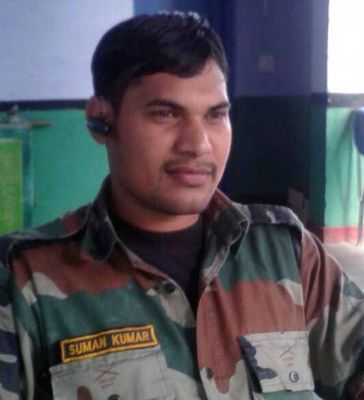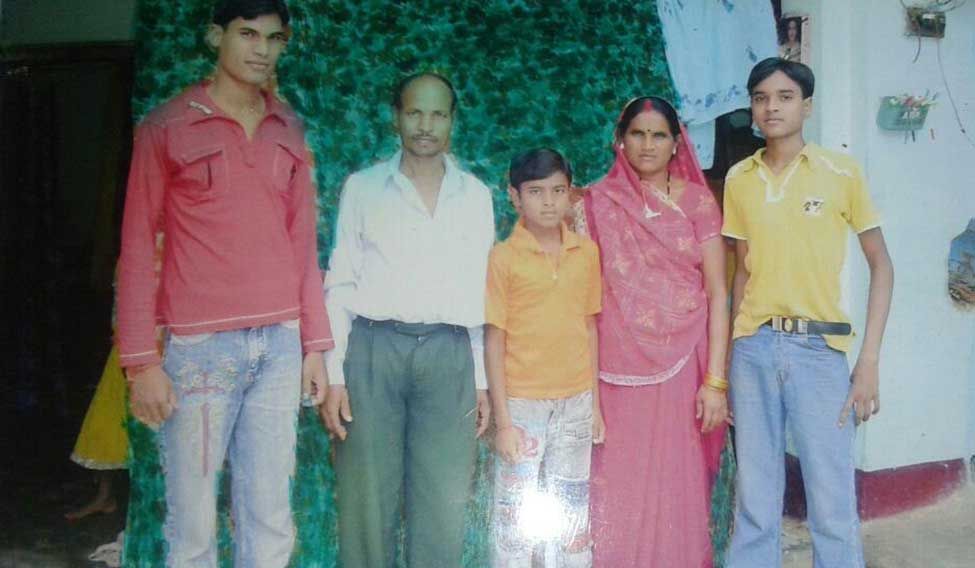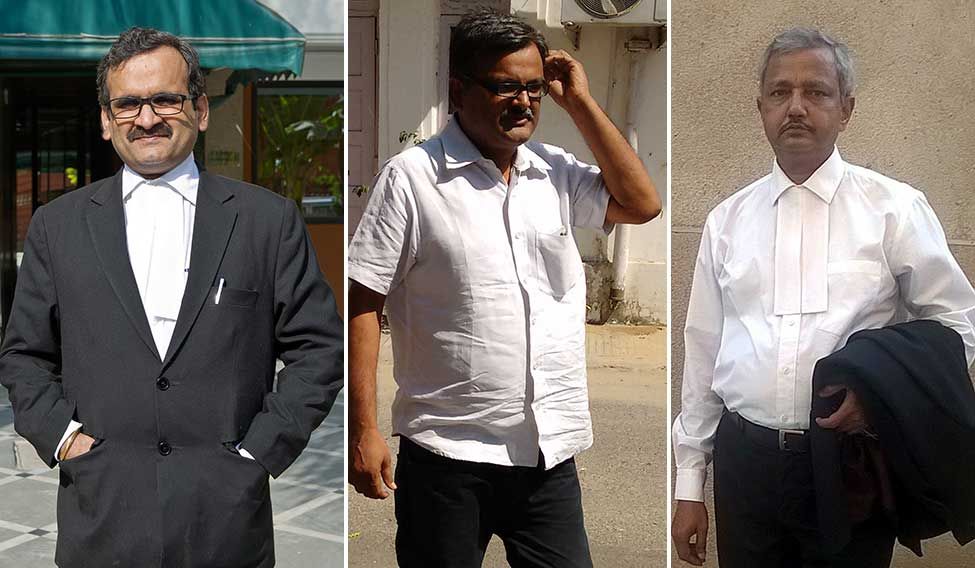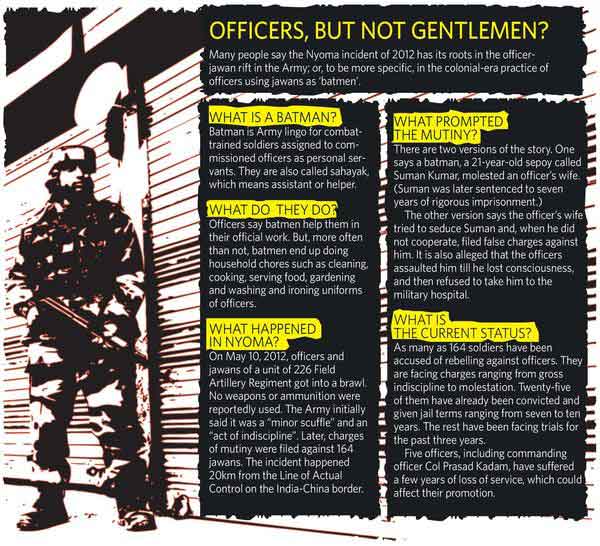It was a chilly morning at the Mahe field firing ranges in Nyoma area of Ladakh on May 10, 2012. A unit of the 226 Field Artillery Regiment, based in Durbuk area, had arrived with their howitzers for firing practice. It was supposed to be a serious affair: the troops had to be trained in warfare in high altitudes and chilly deserts like Ladakh. And, Nyoma was just 20 kilometres from the Line of Actual Control on the India-China border.
But the practice was picnic time for some officers in the regiment. In clear violation of Army rules, Col Prasad Kadam, the commanding officer of the unit, and four of his subordinates—Major Amit Tiwari, Major S.K. Sharma, Major A.D. Kanade and Major Kapil Malik—had arrived in Nyoma with their wives. They were staying at a government guest house near the training ground.
Sepoy Suman Kumar, a 21-year-old fresh recruit, was assigned as one of the ‘batmen', the Army lingo for orderlies assigned to commissioned officers as personal servants. “Suman was asked to provide hot bathing water to an officer’s wife in her room at the guest house when she was alone. That was the beginning of his sad story,” said Vijay Rajgeer, Suman’s brother-in-law.
As per recorded statements in a general court-martial, the wife of the officer showed Suman porn clips on her laptop on the morning of May 9. “And she asked him whether he was married,” Major S.S. Pandey, Kumar’s counsel, told THE WEEK.
Suman, who was to get engaged on his return to his village in Chhattisgarh, did not say anything in reply, and returned to his barracks nearby. When he went to the guest house again at 11am the following day, she allegedly tried to seduce him by standing topless in her room. He turned back and left again. At 12.40pm, he returned to switch off the kerosene heater in the officer’s room, as batmen were required to do. “That was when she made her move,” Suman later told the court-martial. “She asked me to come to bed, and threatened to complain to my boss and implicate me in a false charge if I didn’t. And then she hugged me tight.”
 Suman Kumar, who was allegedly manhandled by officers in Nyoma.
Suman Kumar, who was allegedly manhandled by officers in Nyoma.
When he refused to cooperate, she hurled abuses at him. He ran out and informed the junior commissioned officers of the incident, and pleaded with them to remove him as the batman to the officer concerned. “One of the subedars, Mahender Singh, has given a statement in the court-martial and in the court of inquiry that the jawan [Suman] had told him about the misbehaviour of the officer’s wife,” said Pandey.
But Suman got no help. In fact, soon after he left the guest house and told the JCOs about the incident, Major S.K. Sharma, the second-in-command of the unit, summoned him and, without asking any question, punched him in the face. Sharma was reportedly joined by fellow officers Amit Tiwari, Kapil Malik and A.D. Kanade, who hit Suman in the presence of several jawans till he fell down unconscious. “I was present in the gun area when the whole incident happened,” said Naik Amresh Tiwari. “I saw Major S.K. Sharma, Major A.D. Kanade and Major Kapil Malik beating Suman Kumar and pouring water on him after taking off his clothes in the extreme cold of the open area.”
But, when Tiwari told the court of inquiry about the incident, doctors of the Army Medical Corps stationed at the 3 Division area in Ladakh, under which the unit fell, declared that his eyesight was weak. They said he could not have seen the alleged manhandling of Suman, as he was unable to see beyond 10 metres. Tiwari's statement was later dismissed by the court of inquiry headed by Brigadier Ajay Talwar, the deputy general officer commanding the 3 Division. Interestingly, within a month, the Army doctors declared that Tiwari’s eyesight was a perfect 6/6.
The sight of a bruised jawan lying unconscious and unattended fanned the flames of protest in Nyoma. It snowballed into a no-holds-barred brawl between officers and jawans. The incident was later termed as mutiny—the first by jawans against officers in the history of independent India.
“After the 1984 anti-Sikh riots, a number of Sikh soldiers revolted against the alleged atrocities on fellows Sikhs and against Operation Bluestar. But this [the Nyoma incident] was the first time in independent India that troops had risen against their officers,” said Virbahadur Singh of the NGO Voice of Ex-servicemen.
 Suman Kumar with his family.
Suman Kumar with his family.
As news of the incident spread, jawans from around the area reportedly started rushing to the unit location. They found a badly injured Suman lying at a makeshift medical inspection room in the barracks. To cover up the assault, the officers had refused to admit him to the military hospital, said advocate Anand Kumar, who is fighting charges of mutiny against jawans in different parts of the country. “The trouble started when jawans saw that the whole chain of command had failed to help Suman,” said Pandey. “There was no effort to take him to a hospital. The sole aim of the officers was to hush up their own deeds.”
The officers sensed the mood of the troops in Nyoma and panicked. They, along with commanding officer Col Prasad Kadam, tried to flee the area in their official vehicles. It made the jawans even more belligerent. Fisticuffs ensued, but reportedly no weapons or ammunition were used. The Leh-based 14 Corps rushed in to quell the alleged fighting. When reports of the incident reached Delhi, the media termed it as mutiny. The Army, however, denied it, saying the “minor scuffle” could only be described as “an act of indiscipline”.
From THE WEEK archives: Everyday combat
Soon after the incident, Gen Bikram Singh took over as Army chief and the top leadership was asked to ensure that the Nyoma incident was not repeated. “The Army leadership decided to term the incident, which was a creation of a few officers of the unit, as a mutiny to ensure that the jawans were either court-martialled or shown their place in the force,” said Virbahadur Singh, who has been fighting to ensure justice for jawans accused of rebelling against officers.
Soon after Suman was admitted to the military hospital, he was forcibly discharged. Ajay Talwar allegedly told him that he would make sure that his Army career was finished and he was sent to jail.
 From left: Major S.S. Pandey, Virbahadur Singh, Anand Kumar
From left: Major S.S. Pandey, Virbahadur Singh, Anand Kumar
Suman's trial went on for more than two years. His counsel did not get permission to cross-examine the wife of the officer. During the course of the trial, she made three different statements at various points of questioning. She alleged that Suman had tried to molest her when she was alone in her room and her husband was away on the training field.
Today, Suman is at the Kot Bhalwal Jail in Jammu, where he is serving a sentence of seven years of rigorous imprisonment. “He was charged with attempt to molestation as an afterthought by the higher authorities in the division,” said Pandey. “They knew that the situation was getting out of control for them, as the higher-ups were cautious about their career advancement.”
He questioned the legality of the 3 Division nominating one of its officers to investigate the incident involving Suman. For the sake of probity and fairness, said Pandey, an external officer should have been appointed. “The division commander probably wanted to insulate himself from the charge of failure of command, as this would have hurt his career advancement prospects,” he said.
Lawyers of the jawans who have been accused of taking part in the alleged mutiny have termed the sentence given to Suman as grave injustice. “Can anyone explain the logic behind awarding seven years’ rigorous imprisonment to Suman, who not only was beaten up, but was also in a condition in which he was unable to even raise slogans against officers?” asked Pandey.
As many as 164 soldiers, including junior commissioned officers and non-commissioned officers, have been accused of participating in the alleged mutiny. They are facing charges ranging from gross indiscipline to molestation. Twenty-five of them have already been convicted and given jail terms from seven to ten years. The rest, who are attached to different locations in northern parts of the country, have been facing trials for the past three years. Legal proceedings against them are taking place in military cantonments in Akhnoor near Jammu and Chandimandir in Chandigarh.
Most of them have not been allowed to go on leave or even see their families. It seems the Army does not want anyone to argue on their behalf in military courts. Lawyers of the jawans say the Army has not provided them accommodation even in remote areas where trials are going on. Anand Kumar had to stay in a gurdwara for many days during the trial of a group of jawans in Jammu.
Even those jawans who had stayed away from the scene of trouble in Nyoma have been charged with indiscipline. Col Yogi Sheron, who was commanding officer of the unit before Col Prasad Kadam took charge, flew in to the area and picked up jawans who he suspected could have taken part in the brawl. “He picked up even those who were not present [at the site of the incident],” said Kumar. “These boys are facing [charges] today. Does the law permit a former commanding officer of a unit to involve himself in the inquiry or investigation [into a matter] that did not happen during his command?”
Sources said that 119 jawans accused in the incident are close to being punished. Apparently, the ‘summary of evidence’ against them is nearing completion and they could soon be recommended for court-martial.
According to Kumar, the legal proceedings against the jawans have been marked by prejudice. He said soldiers who were tried in Chandigarh were publicly abused and intimidated to sign statements as per instructions given to them by superiors. When the audio clips of an officer abusing and threatening the jawans were produced before the general court-martial, the Army authorities refused to admit them as evidence of prejudice. Kumar said it clearly showed that the fate of the jawans had already been sealed, and that the proceedings were only a waste of time.
 Graphics: Deni Lal
Graphics: Deni Lal
“Look at the length of this trial,” said Pandey. “Jawans are attached to different units, and they have been waiting for more than three years for their cases to be completed. It seems that the wait will continue for many more years.”
There is criticism that the trials have been farcical. “The officers involved in the incident have not been made available for the recording of evidence, so as to enable the jawans to cross-examine them and prove their innocence,” said Kumar. “Instead, written statements of these officers have been provided in the summary of evidence, even though these officers are still serving and can be summoned at this stage. Even the wives [of the officers] who had earlier given statements in the court of inquiry have not been made available during the recording of evidence.”
The Army has shown a certain zeal in pursuing the case against the jawans. But, in the case of the five officers (Col Prasad Kadam and the four majors) who were reportedly the root cause of the incident, the harshest punishment that the Army could think of was a few years of loss of service, which could affect their promotion. And, some of the majors have even been promoted to the rank of lieutenant colonel.
“Kadam and the other officers will be promoted in a few years,” said Virbahadur Singh. “But what about the jawans who would spend the next seven to ten years in jail, as they are certain to get punished under the charges of mutiny. What is the example we are going to set for our troops? That they cannot expect justice? It’s a class war between officers and jawans. [It tells] the jawans of the future to be afraid of the officer class.”
Former Army officers, however, say one should not look at the Nyoma incident as a clash between officers and jawans, as both the classes are equally important parts of the Army that fight and work together in times of war and peace. “You have to understand the structure of the Army,” said Lt-Gen (retd) Rameshwar Roy, former commander of 16 Corps. “Officers are leaders of men in all the tasks assigned to the force, and this is how the tasks are done. Mutiny is the most serious offence, after cowardice, in the force. Collective insubordination can lead to serious consequences for the war-fighting capabilities of the force. Just imagine what it could mean for the country if 50 troops of a company tell the officer in a war situation that they have decided against fighting.”
The jawans and their families say that because of their poor knowledge of legal systems and hurdles, they were sent to different corners of the country to file cases in the armed forces tribunal to avoid media glare on the issue. “We were misguided by some officers who told us to go to Lucknow [to file cases],” said Rajgeer. “By the time we came to know that we could file the case in Delhi itself, it was very late.”
The Nyoma incident and several similar cases that followed have raised serious questions on the practice of assigning batmen to officers. Officers say batmen help them in their official work. But, in reality, batmen are relegated to household chores such as cleaning, cooking, serving food, gardening and washing and ironing uniforms of officers. “Go to any cantonment, and you can see batmen, who were recruited for combat duties, taking officers’ dogs for walks or standing outside schools of officers’ children with tiffin and vehicles to take them back,” said Virbahadur Singh.
Singh has written to Defence Minister Manohar Parrikar seeking justice for the “victims” of the Nyoma incident. “The Indian soldier of 2015 is not the soldier of the earlier era. He is educated, aware and armed with smartphones. He knows about his surroundings even if he is in the jungle. The officers have to accept this,” said a senior Army officer.
The divide between the officer and the jawan in the Army is now too stark to ignore. One could see the fissures at the sit-ins demanding ‘One Rank, One Pension’, organised by ex-servicemen at Jantar Mantar in Delhi. That the officers and jawans were sitting in different tents was conspicuous.
The Nyoma incident has become a rallying point for jawans. “Why has no one raised questions in the court of inquiry as to what the ladies were doing in the training area illegally and who gave them the permission to do so?” asked Pandey. “The inquiry into the incident, [headed] by Brigadier Talwar, was not for fact-finding, but for fact-fixing.”








